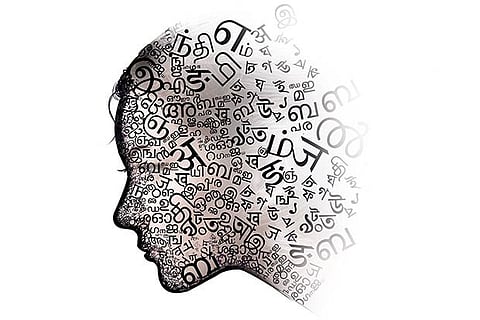

Yet again, that trope of ‘national language’ is being paraded, this time triggered by a social media quibble between actors from the north and south. Picking up from that, many politicians have jumped in to offer their bits of wisdom; the usual suspects raising the spectre of anti-nationals and banishing them to Pakistan. Though the present round of the row originated in the neighbouring State, the issue has crucial resonance in Tamil Nadu, which first sounded the bugle against the imposition of Hindi, something that the leaders of the day characterised as ‘language imperialism’.
First, the basics: India does have 11 national symbols, which include an animal, a bird, tree, flower and fruit, river and aquatic creature. What we do not have is a national language. The leaders, who amalgamated the regional kingdoms into a composite whole on the basis of shared history and culture, left language alone. Instead, they chose 22 regional languages, including Hindi, as scheduled languages.
As English bridged governments and peoples of far-flung states, it was allowed to be used for official purposes for 15 years since the Indian Constitution came into force. But when states with a non-Hindi populace grew restive at the end of the 15-year period, the Centre brought in the Official Languages Act, 1963, amended in 1967, and Official Languages (Use for Official Purposes of the Union) Rules, 1976.
At its core, a language serves two purposes: primarily as a tool of communication and then as the vessel that preserves, and the vehicle that takes forward the history, culture, heritage, and most importantly, the memories of a people. Despite the widely perceived animus that the State seemingly has for Hindi, the resentment is not to the language, but the attempt to impose it. That explains why shop owners in Tamil Nadu, many of whom have only bare minimum education, are able to converse in passable Hindi after the influx of guest workers from the north. This utility of a language is purely practical.
The second role is intangible, but it is that which adds to the brilliant, vibrant kaleidoscope that is India. The better a regional language writer is, the harder it is to translate his or her work. Because contained in the words, phrases and idioms one chooses, is the real culture of one’s society. By penning these down, the writer is weaving them intricately into the greater whole that the country is.
Trying to erase or undermine that with a top-down approach is not different from trying to paint a rainbow with one colour; an attempt that is fraught with danger as recent history has shown. There are many lessons to be learnt from the language protests of Tamil Nadu (against Hindi imposition), Sri Lanka (against the Official Language Act of 1956, popularly called Sinhala Only Act) and pre-independence Bangladesh (against replacing Bangla with Urdu by Pakistan). It is important to remember that none of these ended in favour of the hegemons.
A more instructive tale is from Indonesia, where the new rulers decided not to impose Javanese – spoken by about 40 per cent of the population just like the case of Hindi in India – but instead chose to devise a new language, Bahasa Indonesia, as the national language. Not having one regional language as the national language removed the element of hierarchy.
It is inconceivable that these lessons from history are lost on the Hindi hegemons, which indicates a calculated ploy to use the national language trope for political purposes. It reduces a beautiful language, which was used with grace and elegance by great writers, to a mere dog whistle. That is cynical and a recipe for disaster, and it has to stop.
Visit news.dtnext.in to explore our interactive epaper!
Download the DT Next app for more exciting features!
Click here for iOS
Click here for Android